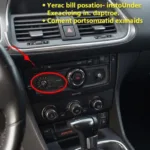OBD2 forensics is revolutionizing how law enforcement investigates vehicle-related incidents. By accessing data stored within a vehicle’s onboard computer, investigators can gain valuable insights into accidents, thefts, and other criminal activities. This article delves into the power of obd2 forensics for law enforcement, exploring its applications, benefits, and the future of this rapidly evolving field.
Unlocking the Black Box: How OBD2 Forensics Works
OBD2, or On-Board Diagnostics II, is a standardized system that allows access to a vehicle’s diagnostic and operational data. This data, recorded by the vehicle’s Electronic Control Unit (ECU), can be a goldmine for law enforcement. Using specialized obd2 scanners, investigators can extract information related to speed, braking, acceleration, steering angle, seatbelt usage, and much more. This data paints a detailed picture of what happened leading up to, during, and even after an incident.
Applications of OBD2 Forensics in Law Enforcement
The applications of obd2 forensics are vast and continue to expand as technology advances. From reconstructing accident scenes to uncovering evidence of fraud, OBD2 data provides crucial evidence in a variety of scenarios.
Accident Reconstruction: Piecing Together the Puzzle
In accident investigations, obd2 forensics provides objective data that can corroborate or refute witness statements and driver accounts. By analyzing vehicle speed, braking force, and other parameters, investigators can determine the sequence of events leading to a collision. This information is critical for determining liability and ensuring justice is served.
Vehicle Theft Investigations: Tracking Down Stolen Cars
OBD2 data can be instrumental in recovering stolen vehicles. Some advanced scanners can even pinpoint the location of a vehicle by accessing GPS data logged by the ECU. This information can significantly expedite the recovery process and potentially lead to the apprehension of the thieves.
Insurance Fraud Investigations: Unmasking Deception
OBD2 forensics plays a crucial role in detecting insurance fraud. By analyzing vehicle data, investigators can identify discrepancies between reported events and actual vehicle behavior. For example, if a driver claims they braked hard before a collision, but the OBD2 data shows no significant braking activity, it could indicate fraudulent activity.
Criminal Investigations: Unveiling Hidden Clues
Beyond traffic incidents, obd2 forensics can be valuable in other criminal investigations. For example, data related to vehicle location and usage can provide crucial evidence in cases involving drug trafficking, kidnapping, or other serious crimes.
The Future of OBD2 Forensics in Law Enforcement
As vehicles become increasingly sophisticated and connected, the potential of obd2 forensics in law enforcement will only grow. With advancements in data analysis techniques and the integration of other technologies, such as video footage and sensor data, OBD2 forensics is poised to become an even more powerful tool for solving crimes and ensuring public safety.
Emerging Technologies: Expanding the Horizon
The integration of artificial intelligence (AI) and machine learning (ML) into obd2 forensics holds immense promise. These technologies can automate data analysis, identify patterns, and even predict future events based on past vehicle behavior.
Enhanced Data Security: Protecting Sensitive Information
As the reliance on OBD2 data increases, so does the importance of data security. Protecting the integrity and confidentiality of this information is paramount to ensuring its admissibility in court and maintaining public trust.
 The Future of OBD2 Forensics in Law Enforcement
The Future of OBD2 Forensics in Law Enforcement
Conclusion: The Indispensable Role of OBD2 Forensics
OBD2 forensics has become an indispensable tool for law enforcement, providing crucial evidence in a wide range of investigations. From accident reconstruction to criminal investigations, the ability to access and analyze vehicle data is transforming the way law enforcement operates. As technology continues to advance, obd2 forensics will undoubtedly play an even more critical role in ensuring justice and public safety.
FAQ
-
What is OBD2 forensics?
- OBD2 forensics is the use of data from a vehicle’s onboard computer to investigate incidents.
-
What type of data can be extracted from an OBD2 port?
- Data such as speed, braking, acceleration, and location can be extracted.
-
How is OBD2 forensics used in accident investigations?
- It helps reconstruct the events leading to an accident, determining liability.
-
Can OBD2 data be used to track stolen vehicles?
- Yes, in some cases, GPS data from the ECU can pinpoint a vehicle’s location.
-
How does OBD2 forensics help with insurance fraud investigations?
- It can reveal inconsistencies between reported events and actual vehicle behavior.
When you need support, please contact us via WhatsApp: +1(641)206-8880, Email: [email protected] or address 789 Elm Street, San Francisco, CA 94102, USA. We have a 24/7 customer support team.
